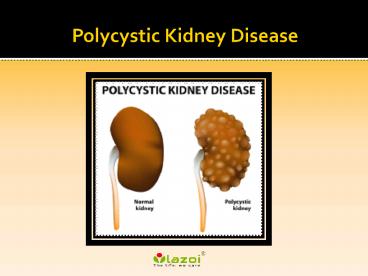Polycystic kidney disease : Causes, Symptoms, Diagnosis, Complication and Treatment - PowerPoint PPT Presentation
Title:
Polycystic kidney disease : Causes, Symptoms, Diagnosis, Complication and Treatment
Description:
Polycystic kidney disease (PKD) is a genetic disorder characterized by the growth of several cysts in the kidneys. Autosomal dominant PKD is the most common inherited form while autosomal recessive PKD is a rare. – PowerPoint PPT presentation
Number of Views:126
Title: Polycystic kidney disease : Causes, Symptoms, Diagnosis, Complication and Treatment
1
Polycystic Kidney Disease
2
Polycystic Kidney Disease
- Polycystic kidney disease (PKD) is an
inherited kidney disease. It is denoted by cysts
formation in the kidney and enlargement of the
kidney. - It is the 4th leading cause of kidney failure
- It can also cause developing cysts in the liver
and other complication - It impairs kidney function and eventually lead to
kidney damage and failure
3
Symptoms of polycystic kidney disease
- Certain symptoms of polycystic kidney disease
may include - Blood in urine
- Frequent urination
- Pain in the abdomen and back
- Slight feeling of heaviness in the back
- Kidney stones
- Pale skin colour
- Skin that bruises easily
- Joint pain
- Nail abnormalities
- Fatigue
- Urinary tract infections
4
Causes of Polycystic Kidney Disease
- The cause of Polycystic Kidney Disease is mostly
inherited, But less commonly, it can occur in
person who can previously any kidney diseases. - There are three types of Polycystic Kidney
Disease - Autosomal dominant polycystic kidney disease -
Also called adult polycystic kidney disease and
account for 90 of cases. Someone who has a
parent with polycystic kidney disease has 50
chance of developing such condition - Autosomal recessive polycystic kidney disease -
It is a much less common type of polycystic
kidney disease. Here, both the parent should have
polycystic kidney disease to develop polycystic
kidney disease for children. The person will have
no symptom for polycystic kidney disease if one
gene is present. - Acquired cystic kidney disease- It is not
inherited and usually occurs in life. It may
develop to patients who have other kidney
problems.
5
Diagnosis of polycystic kidney disease
- A family history and knowing the symptoms can
help the doctor to diagnose polycystic kidney
disease. Certain diagnose techniques may include - Abdominal ultrasound- Imaging technique to look
for the cysts in kidney - Abdominal CT scan- Imaging technique which can
detect small cysts in the kidney - Abdominal MRI scan- Technique which visualize
kidney structures and look for cysts - Intravenous pyleogram- Contrast dye which is used
to look for blood vessels more clearly in X-ray.
6
Treatments of polycystic kidney disease
- Some treatments can be used to decrease certain
symptoms, which may include - Pain medication to decrease pain I abdomen and
back - Blood pressure medication to decrease blood
pressure - Antibiotics which will treat urinary tract
infection (UTI) - A low sodium diet
- Surgery to cut cysts and can relieve symptoms
- Diuretics to help remove excess fluid from the
body.
7
Complications of polycystic kidney disease
- Certain complications can occur due to
polycystic kidney disease, such as - Cysts in liver, pancreas and testicles
- Cataracts and blindness
- Liver failure
- Kidney stones
- Cardiovascular diseases
- Bleeding and bursting of cysts
- Brain or aortic aneurysms
- Anaemia
8
CONNECT WITH US
- Logon to
- www.lazoi.com
- Like us on Facebook
- https//www.facebook.com/LazoiTheLife
- Follow us on Twitter
- https//www.twitter.com/lazoithelife
- Follow us on Pinterest
- https//www.in.pinterest.com/lazoithelife































